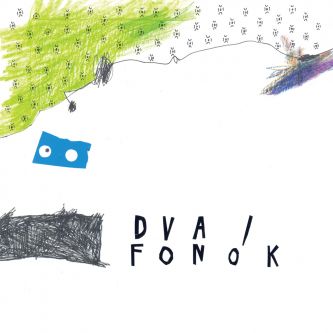
Non-exist nations’ folklore alias “Folklór neexistujících národů” or else tango, cabaret, circus, pop songs, kitchen beatbox or freakfolk.
The debut album of the project "Dva" is called “Fonók” (it is the name of spinners in Hungarian; however, for "Dva" it means “Sounds” in the language of their own) and it is very original and exceptional, both with its concept as well as non-exist nations poetics and sound which is novel and magnificent. Except for the group “Dva”, it was namely Berliner Jayrope who assisted significantly in the final above standard sound. The album includes fifteen songs of legendary non-existent bands in non-existent world languages put together during travels through the kitchen. Each nonexistent region has its own representative on the album; each nonexistent language has its own translation. Sincere and exacting ethnographic work paid dividends…
Attic Equipment in the cottage located in a small village in the north of the Czech Republic was humble during the album’s recording; however, it influenced the album sound fatally. Disabled broadcast audio mixer Studer and AKG microphones from 1948. “When you set bounds, paradoxically, then it is much easier to work in the time of unlimited software possibilities”. The band says. The recording was assisted by a very experienced broadcast technician – Bára’s dad – here with a solder, here with a skillet. On their album, Dva chose to cooperate with a well-known Berlin musician and producer Jayrope who is no novice in the field of music production. He collaborated with artists such as Arto Lindsay, Rechenzentrum or Atari Teenage Riot, he himself played in many projects and bands. They met in 2007, how else than through Myspace. Immediately and willingly, he agreed with the offer of a one-month stay in the mountains. Continuous supply of toasts spread with lard, goat’s milk and Szeged goulash only helped to keep “folkloric” spirit of the whole album. Besides own music, also dachshund named Ferda, common buzzards, ever-present chirp of grasshoppers, gherkin conservation and amplifier on the column in the middle of the wood can be heard from several places. The album was also influenced by a partial eclipse of the moon.
Final mix and mastering were performed in the studio of sound engineer Mark Bihler, Mute records, in the centre of Berlin, again on analog tape. Using old technologies and the contribution of Jayrope producing skills, the album keeps homely atmosphere of former records of Dva “principally, we do not distinguish between analog and digital. In records, we enjoy sounds which we produce by “analog” way (voices, shorts) more and as for digital “effects” we like loops and reversals”, by thus, Fonók has gone much further in the field of sound richness and it has given space for lovely surprising designers´ ideas.
| preview | name | time | |
| 01 Mikrotango | 00:39 | ||
| 02 Nunovó Tango | 03:27 | ||
| 03 Kisma Ajoas | 03:14 | ||
| 04 Három Kérom | 02:45 | ||
| 05 Francé Trancé | 02:56 | ||
| 06 Krieliškaj | 04:04 | ||
| 07 Dua Dua | 03:17 | ||
| 08 Pingu Hop | 04:07 | ||
| 09 Nanuk | 02:24 | ||
| 10 Labalibe | 03:26 | ||
| 11 Disko Cirkús | 03:41 | ||
| 12 Fin | 03:34 | ||
| 13 Valz Liepája | 03:01 | ||
| 14 Bádalisk | 02:16 | ||
| 15 Strenge | 02:22 |